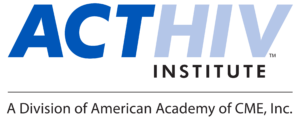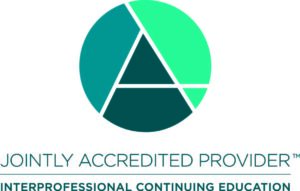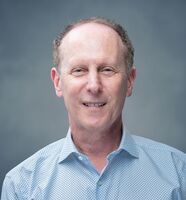Best of ACTHIV®: HIV 101 – Pathogenesis
|
Release Date: September 15, 2023 |
 |
The 17th Annual American Conference for the Treatment of HIV® (ACTHIV® 2023) was held May 4-6, 2023. The conference and this Best of ACTHIV web archive were supported by educational grants from Gilead Sciences; Janssen Therapeutics, Division of Janssen Products, LP; Merck, Theratechnologies, and ViiV Healthcare. |
Description:
Selected by attendees and the program planning committee as one of the best sessions of the ACTHIV® 2023 conference for the frontline HIV care team, this activity will describe HIV infection and viral dynamics, define how viral dynamics impact management of antiretroviral therapy, and describe current progress in area of HIV cure/remission
Learning Objectives
- Describe HIV infection and viral dynamic
- Define how viral dynamics impact management of antiretroviral therapy.
- Describe current progress in area of HIV cure/remission.
Activity Faculty
|
|
Faculty Bios:
Eric S. Daar, MD, is the Chief of the Division of HIV Medicine at Harbor-UCLA Medical Center and Professor of Medicine at the David Geffen School of Medicine at UCLA. He is an Infectious Diseases-trained clinician-investigator with 30 years experience providing HIV care and conducting clinical and translational research related to HIV/AIDS. His research focus has been on the development and implementation of studies to address HIV pathogenesis and clinical questions related to optimal management of HIV infection. He has received research support from NIH, the State of California and Industry, including currently being the site Principal Investigator on multiple NIH-funded projects including the AIDS Clinical Trials Group (ACTG). He is also a member of the Health and Human Services Panel for Adult and Adolescent HIV Treatment Guidelines. In addition, he has been an active researcher in area of COVID-19 and member of the NIH COVID-19 Treatment Guidelines.
Accreditation and Credit Designation

In support of improving patient care, American Academy of CME, Inc. is Jointly accredited by the Accreditation Council for Continuing Medical Education (ACCME), the Accreditation Council for Pharmacy Education (ACPE), and the American Nurses Credentialing Center (ANCC), to provide continuing education for the healthcare team.
Physicians
American Academy of CME, Inc., designates this enduring material for a maximum of 0.25 AMA PRA Category 1 CreditsTM. Physicians should claim only the credit commensurate with the extent of their participation in the activity.
NPs and Nurses:
American Academy of CME, Inc., designates this educational activity for 0.25 ANCC contact hours
(0.1 Pharmacotherapeutic Contact Hours).
Physician Assistants
American Academy of CME, Inc. has been authorized by the American Academy of PAs (AAPA) to award AAPA Category 1 CME credit for activities planned in accordance with AAPA CME Criteria. This activity is designated for 0.25 AAPA Category 1 CME credits. Approval is valid until September 15, 2025. PAs should only claim credit commensurate with the extent of their participation.
All other members of the care team will receive a certificate of participation.
Target Audience
This activity has been designed to meet the educational needs of the HIV care team, including physicians (both specialists and primary care/family medicine), nurses, nurse practitioners, physician assistants, and pharmacists who are in practice but are newer to HIV medicine or who are in training. Other healthcare providers may also participate.
Disclosure Statement
According to the disclosure policy of the Academy, all faculty, planning committee members, editors, managers and other individuals who are in a position to control content are required to disclose any relationships with any ineligible company(ies). The existence of these relationships is not viewed as implying bias or decreasing the value of the activity. Clinical content has been reviewed for fair balance and scientific objectivity, and all of the relevant financial relationships listed for these individuals have been mitigated.
The opinions expressed in this accredited continuing education activity are those of the faculty, and do not represent those of the Academy or ACTHIV®. This educational activity is intended as a supplement to existing knowledge, published information, and practice guidelines. Learners should appraise the information presented critically, and draw conclusions only after careful consideration of all available scientific information.
Off-Label Disclosure
There will be no off-label/investigational uses discussed in this presentation.
Faculty Disclosure
Eric Daar, MD: discloses the following relevant relationships: Advisory Board/Consultant – Gilead Sciences, Merck, ViiV Healthcare; Grant/Research Support – Gilead Sciences, Merck, ViiV Healthcare.
Planner Disclosures
The following individuals have no relevant financial relationships with ineligible companies to disclose:
Beatrice Aladin, MD, MPA; Jillian Baron, MD, MPH; John T Brooks, MD; J Kevin Carmichael, MD, FIDSA; Lisa Catalli, MSN, NP-C; Jonathan Colasanti, MD, MSPH; Walid El-Nahal, MD MHS; Courtney V. Fletcher, PharmD; Rajesh Gandhi, MD; Mary T. Glenshaw, PhD, MPH, OTR/L; Jose I Gutierrez Jr., PhD, FNP-BC, AAHIVS; Tomasz Z. Jodlowski, BCIDP, BCPS (AQ-ID), AAHIVP; John JD Juchniewicz, MCIS, CHCP, FACEHP; H. Nina Kim, MD, MSc; Natalie Kirkwood, RN, BSN, JD; Harry Lampiris, MD; Sharon Lee MD; Vincent Lo Re III, MD, MSCE; Lorenzo McFarland, DHA, MPH, MSW, PMP; Paul J. Miniter, MS; Edward Moylan, RP; Michelle Ogle, MD, FAAP, FPIDS, AAHIVS; Bruce J. Packett II; Asa Radix, MD, PhD, MPH; Dianne Rausch, PhD; Jeri Sumitani, MMSc, PA-C; Virginia Triant, MD, MPH; Ronald D. Wilcox MD
The following individuals have relevant financial relationships to disclose:
Dawn Averitt, BIS: Advisory Board/Consultant – Gilead Sciences, Merck, ViiV Healthcare
Roger Bedimo, MD, MS: Advisory Board/Consultant – ViiV Healthcare, Gilead Sciences, Merck, Theratechnologies, Janssen; Grant/Research Support – Merck, ViiV Healthcare*
Eric Daar, MD: Advisory Board/Consultant – Gilead Sciences, Merck, ViiV Healthcare; Grant/Research Support – Gilead Sciences, Merck, ViiV Healthcare
Carlos del Rio, MD: Advisory Board/Consultant: Resverolix
Christopher Evans, MD, MPH: Grant/Research Support: GlaxoSmithKline/ViiV Healthcare
Oluwaseun Falade-Nwulia MBBS, MPH: Advisory Board/Consultant: Gilead Sciences; Grant/Research Support: AbbVie
Margaret Hoffman-Terry, MD, FACP, AAHIVS: Speakers Bureau – Gilead Sciences, ViiV Healthcare
Rupa Patel, MD MPH: Advisory Board/Consultant: Gilead Sciences*, ViiV Healthcare*; Grant/Research Support: Gilead Sciences, ViiV Healthcare
Tonia Poteat, PhD, MPH, PA-C: Advisory Board/Consultant – Merck, ViiV Healthcare
Jennifer Price, MD, PhD: Advisory Board/Consultant – Theratechnologies*, Gilead Sciences*; Grant/Research Support – AbbVie, Gilead Sciences, Merck, Zydus, VIR Biotechnology; Speaker’s Bureau – Gilead Sciences*, Theratechnologies*
Renslow Sherer MD: Grant/Research Support – Gilead Sciences
William R Short, MD, MPH, FIDSA: Advisory Board/Consultant – ViiV Healthcare; Grant/Research Support: Gilead Sciences; Speaker’s Bureau – Janssen*, ViiV Healthcare*
Sarah Smith, MHS, PA-C, AAHIVS: Advisory Board/Consultant – Jansen, Merck, Gilead Sciences; Speakers Bureau: – Jansen, Merck, Gilead Sciences
Babaafemi Taiwo, MBBS: Advisory Board/Consultant – ViiV Healthcare/GlaxoSmithKline, Johnson & Johnson, Gilead Sciences*, Merck*
Pablo Tebas, MD: Advisory Board/Consultant – Merck, ViiV Healthcare, Gilead Sciences*
Melanie Thompson, MD: Advisory Board/Consultant – Excision Biotherapeutics Grant/Research Support Gilead Sciences*, GlaxoSmithKline*, Merck*, Frontier Biosciences*, Cepheid*
Susan Weiss, FNP-BC, MSN, AAHIVS: Advisory Board/Consultant – ViiV Healthcare*
*Indicates relationship has ended
Implicit Bias
Implicit bias refers to unconscious attitudes and stereotypes that influence our thoughts, judgements, decisions, and actions without our awareness. Everyone is susceptible to implicit bias, even clinicians. In healthcare, implicit biases can have a significant impact on the quality of care an individual receives. These biases can be both favorable and unfavorable, and are activated involuntarily without an individual’s awareness or intentional control.
Studies have indicated that healthcare providers’ incorrect perceptions can impact providers’ communications and clinical decision-making contributing to disparities in clinical outcomes. Addressing implicit biases in healthcare is critical to improving health outcomes and promoting health equity for all patients. Patient-centered care can reduce the impact of implicit bias, by treating each patient as a unique individual who may or may not hold beliefs associated with their backgrounds and circumstances. In addition, recognizing implicit bias in one’s own practice using techniques such as self-reflection and mindful clinical decision-making can ensure more equitable and effective care to all patients.
Over the past several decades, cognitive science research has demonstrated human behavior, beliefs and attitudes are shaped by automatic and unconscious cognitive processes. The healthcare profession is devoting greater attention to how these automatic and unconscious processes impact care including: (1) preferential treatment toward or against specific patient populations causing healthcare inequities, (2) influence patient-provider communications leading to misunderstandings and mistrust, and (3) impact access to healthcare and affect treatment decisions resulting in misdiagnosis, delays in treatment and specialty referrals and poor pain management.
Considering one might have unconscious biases and exploring them may be uncomfortable because the very idea that they exist may conflict with how clinicians perceive themselves. It is only by becoming aware of one’s unconscious biases that members of the healthcare team can take steps to mitigate them to ensure all their patients are treated receive quality healthcare.
Instructions on How to Receive Credit
There are no fees to participate in the activity. Participants must review the activity information including the learning objectives and disclosure statements, as well as the content of the activity. To receive CME/CE credit for your participation, please complete the post-assessment and program evaluation. Your certificate will be available for printing immediately.
Privacy and Contact
For more information about the American Academy of CME privacy policy, please access http://www.academycme.org/privacy.htm For any questions, please contact: [email protected].
Hardware/Software Requirements
This program should be viewed at a resolution of 1024 x 768 or higher using current versions of Microsoft Internet Explorer, Firefox, Chrome or Safari. A high-speed Internet connection is recommended.
Copyright
© 2023. This accredited continuing education activity is held as copyrighted © by American Academy of CME. Through this notice, the Academy grants permission of its use for educational purposes only. These materials may not be used, in whole or in part, for any commercial purposes without prior permission in writing from the copyright owner(s).

